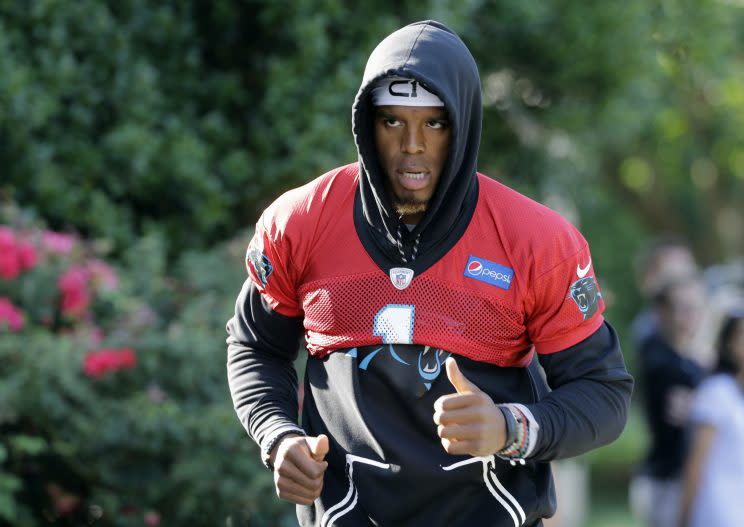The season of reckoning for Cam Newton and Carolina
After months of talking about “evolving” and taking steps forward, the Carolina Panthers and owner Jerry Richardson revolved. Back to a general manager who put cornerstones in place but mangled the salary cap. Back to a way of business that puts loyalty above reality. Back to comfort over discipline.

When the Carolina Panthers fired general manager Dave Gettleman last week, it peeled open a fiscal culture clash between the owner and his chosen team-builder. And Jerry Richardson’s response to that was to look for progression inside of regression. Specifically, to fire Gettleman – who could be cutthroat and spendthrift to a fault – and replace him with Marty Hurney, the previous longtime Panthers GM with an eye for talent and an open wallet. That the shift in direction happened so late in the offseason is dubious. That it’s simultaneously playing out over the top of the most pivotal months of quarterback Cam Newton’s career is potentially disastrous.
More than ever, the front-office shuffle puts the rehabilitation of Cam Newton on center stage. Make no mistake, this is a shuddering Panthers franchise. There’s no other way to explain going 15-1 in 2016 and replacing Gettleman after he turned over so much of the roster in the last four years. For a team that hasn’t looked right since the Super Bowl 50 loss to the Denver Broncos, this is a dramatic shift back to an ideology that was once deemed a failure. It puts the Panthers at a crossroads. And more than anything, it makes Newton’s rehabilitation a potentially significant turning point.
Simply put, Newton’s health saves or kills this season for Carolina. In turn, this season makes or breaks the foreseeable future of the franchise.

That’s not hyperbole, either. Not with Gettleman’s financial restraint being such an integral part of what Carolina was trying to accomplish over the last four years. Whether you agreed with his often tight-fisted approach or not, Gettleman did have a defined plan for how he wanted the franchise to run. Many of the principles were carried over from his Super Bowl-winning roots with the New York Giants – particularly the idea of value-based roster building. Players had slotted values. Those values were adjusted with age and the state of the salary cap. It called for a discipline that was bound to rub a lot of guys the wrong way.
Ultimately, that’s what broke the relationship in Carolina. According to a handful of league sources who spoke with Yahoo Sports, it ultimately came down to Richardson’s growing discomfort over the way Gettleman valued and ultimately retained what the owner believed was “core” talent. In short, Gettleman was a stickler for adjusting player value based on age and replaceability within a scheme. Players had salary slots and those slots ruled the negotiating table. Richardson, on the other hand, often saw players more emotionally. They weren’t just “slots” or “schematic cogs”. They were foundational pieces within the locker room and community. And that bought some generosity and goodwill at the negotiating table.
In the end, those two vantages didn’t mesh well. And ultimately, sources said, that’s what undid Richardson’s commitment to Gettleman. Simply put, the owner lamented some deals that didn’t get done in the past. And there were deals that needed to be done now that were heading down that same path. Richardson wasn’t willing to accept seeing guys like Thomas Davis and Greg Olsen become the next Jordan Gross – the bedrock offensive tackle whose contract fight with Gettleman lingered for years in the locker room.
This is why Hurney – who was fired and replaced with Gettleman in 2013 – was ultimately brought back into the fold as interim general manager. And it’s also why Hurney has a real shot to get the interim tag taken off and pull the unheard-of reclamation of his previous GM job. Because Richardson sees him as someone who can evaluate lasting talent while also understanding how certain pieces should be treated. Essentially, it’s two guys on the same emotional wavelength when it comes to roster building.

So what does that mean now?
At the moment, it’s hard to say. But changing a general manager typically means alterations to a building plan. At best, alterations can translate into time consumption. At worst, they can knock a roster off its axis and cause a crash. At the very least, the Panthers still have an upper-tier roster. And thanks to Gettleman, Hurney has a very healthy cap to get extensions done. There should be some short-term stability. But the long-term is all about Newton.
The franchise quarterback isn’t 100-percent heading into training camp. He has just begun throwing again after offseason shoulder surgery. And there is a chance he may not see game snaps until the start of the regular season. That’s a precarious reality for an offense that needs plenty of work on timing and chemistry. But what Carolina can’t afford is another injury or Newton not being right when he steps onto the field.
His progress in that vein is paramount. As much as the Panthers have reached back into time to get their front office back on the same page as the owner, Carolina can’t reach so far back that it goes through another middling season. This is still a contending roster. And if that doesn’t materialize on the field, there will be questions about the coaching staff. Hurney wants this general manager job long term. He can’t afford a repeat of 2016. Rivera needs a bounce back season. He can’t afford a repeat, either. And Newton needs to be healthy again and showing that his MVP season was the norm, not an aberration.
A month ago, there was a lot riding on Carolina’s training camp progress. Heading into next week with a revolving front office, it’s far more than anyone could have imagined.

